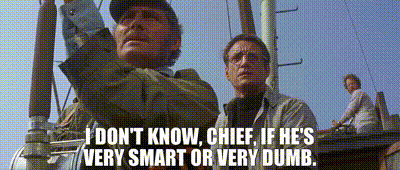Football ...
Basketball ...
Baseball ...
Other Sports ...
Futbol ...
🤫995🤫 ...
Gambling ...
Movies & TV ...
Music ...
Hobbies ...
Lulz ...
Food & Travel
...
Daily Texan ...
Business & Markets ...
Cloak Room ...
Help ...
For Sale ...
Board Discussion ...
Advertise...
Tailgate Donations
-
Posts
14964 -
Joined
-
Last visited
Content Type
Profiles
Forums
Store
Downloads
Recruiting - 2020
2019-2020 Football Season
Football
Entertainment
Sports
News and Business
Cloak Room
Transfer Portal
Recruiting
Events
Everything posted by Bevo
-
Well, he was named after whole wheat so I assume that he would be a hell of a baker.
-
Is this even possible?
-
Wouldn't it have to rain here first?
-
What he is hinting at but won't say is that there was a conspiracy by the Israeli government to let Hamas attack Israel in an attack much worse relatively than the WTC in order for Israel to go to war against Hamas, Hezbollah, and Iran.
-
Could Ukraine use that stuff? Israel should ship it to them.
-
Sounds like you are warming up to Brenen Thompson.
-
We did pretty well a decade ago with sanctions against Iran, but that coalition began showing cracks because of oil and gas. And the focus was more on slowing Iran's nuclear program than trying to end Iran's proxies. However, the financial implications of the sanctions weakened the proxies even if they weren't the target. So, sanctions could work again to stop the proxies. But when Western countries need natural resources and profits can be made by dealing with Iran, putting together sanctions seems improbable. And I don't think very many countries are interested in escalating things in the middle east. The world, I think, is pretty satisfied with the status quo and with Russian oil and gas offline, middle east oil and gas becomes more vital to Western interests. This is especially true in the US where the administration can't afford a spike in oil and gas prices before elections. But the same could be said in Germany or the UK or a whole host of other countries at other times during the year. So, this is a long-winded way to say that the world is fine with sanctions in theory but it won't jointly attack Iran if Iran is a bad actor. And sanctions won't happen because money and consequences.
-
It sounds like Israel's next move is ground forces against Hezbollah. At some point though, it needs to go after Iran's nuclear capabilities. Now is the time to strike when proxy forces are incapacitated. The current US administration may help some with intelligence but it would also probably disclose Israel's plans if they were made available because of fears of escalation. And I don't see any way the international community would get actively involved like it did with the strong embargo against Iran a decade ago. Israel is going to have to go it alone with golf claps from everyone who doesn't want a nuclear Iran.
-
All opinions are borderline CR to CR - that is the reason @immamac tries keeping DT for news only. As for arguing with CR personalities, my issue is that it is like arguing with attorneys - no one has time for that shit - and no one has the desire for that shit.
-
Maybe, maybe not, but it was pretty damn funny either way.
-
What do you think is Israel's and Hezbollah's next move?
-
This sounds about right.
-
I understand the pessimism, but this has led to the destruction of the instrument that Iran used to protect itself. Without Hezbollah and Hamas, and with crappy air defenses, Iran is totally vulnerable to an air assault on, for example, Iran's entire nuclear program. If Israel were ever to strike Iran's nuclear program, now would be the time. And if Iran tried to do anything about it, it could lead to a lack of arms for the replacements of Hezbollah and Hamas for many years. Meanwhile, Lebanon and Syria can finally rid themselves of their largest impediments to democracy. Not saying that it will happen, but it could happen, which we haven't been able to say for a long, long time. If democracies did develop, which is doubtful, Israel would find itself on a new road to peace in the region.
-
He'll have to get stronger for sure. The problem with speed rushing is that it usually means looping from the outside leaving an inside gap. It's pretty hard to maintain gap integrity when rushing. He is fast enough though that he can often close the gap before the running back makes it to the hole.
-
He would have killed it in Sark's system
-
Jump to content How Israel killed Hezbollah’s leader Nasrallah and crippled the enemy on its border Heaviest blow of ruthless military campaign in Lebanon devastates group and may change face of Middle East Adrian Blomfield in Beirut 28 September 2024 8:40pm The plan had been years in the making, the target one of the most famous figures in the Arab world, and one of the most hated in Israel. In the 11 days before it was implemented, Israel had conducted a military campaign of metronomic efficiency in Lebanon, each phase meticulously and ruthlessly executed, each blow delivered as Hezbollah was still staggering from the one that preceded it. But then, at dusk on Friday, came the heaviest blow of them all — one that may forever cripple Hezbollah, weaken Iranian influence and potentially even reshape the Middle East itself. Their detonations echoing across the Beirut skyline, more than 80 bunker-busting bombs pulverised not just four high-rise buildings above the ground but also the subterranean complex that housed Hezbollah’s secret headquarters. The synchronised sabotage of Hezbollah’s communication devices and other assassinations in previous days had shown Israel was not short of accurate intelligence about a movement that it had clearly infiltrated at all levels. But this was on a different scale. If previous attacks had systematically severed many of the spokes of the Iran-backed movement, this one was striking at its very hub. Not only did Israel know the location of the secret bunker of a man who had not been seen in public for two decades, they knew where Hassan Nasrallah would be and that he would be meeting some of the few senior commanders who had survived the assassination strikes of the preceding weeks. In fact, Israel had known for months, tracking Nasrallah’s every movement until deciding to strike this week after learning that the Hezbollah leader planned to move to an unknown location, according to Israeli officials quoted by the New York Times. As the plans were finalised, it was decided the operation should be mounted as Benjamin Netanyahu, the Israeli prime minister, was in New York to address the United Nations General Assembly – something Israel’s military chiefs believed might persuade Nasrallah to lower his guard. The ruse succeeded. As Mr Netanyahu addressed the press in New York following his speech, an aide whispered in his ear and the Israeli prime minister withdrew to give the command to attack. For hours afterwards neither side knew Nasrallah’s fate but gradually, amid the chaos in southern Beirut, there was enough intelligence to confirm that he was indeed dead – something Hezbollah itself grudgingly conceded a few hours later. Sweetening the triumph for Israel, the bomb did not just kill Nasrallah. A general from Iran’s Revolutionary Guard was among the dead, as was Ali Karaki, a senior Hezbollah commander who survived a previous assassination attempt just days earlier. Mr Netanyahu said on Saturday that Israel had “settled the score” with the killing of Nasrallah. “We settled the score with the one responsible for the murder of countless Israelis and many citizens of other countries, including hundreds of Americans and dozens of French,” he said, adding that Israel had reached “what appears to be a historic turning point” in the fight against its “enemies”. The Israeli prime minister also claimed the death of Nasrallah would help facilitate the return of Israeli hostages held in Gaza. “The more (Hamas leader Yahya) Sinwar sees that Hezbollah will no longer come to his aid, the greater the chances of returning our captives,” he said, adding that Israel was “determined to continue striking our enemies”. Israel’s military leadership also made it clear on Saturday that this was not the end of the assassinations, with remaining Hezbollah commanders still in their sights. “This is not the end of our toolbox,” Lt Gen Herzi Halevi, Israel’s top army general, told reporters. “We have more capacity going forward. Anyone who threatens the state of Israel, we will know how to reach them.” If this was a moment of unalloyed triumph for Israel’s military establishment and, so he hopes, a passage to possible political redemption for Mr Netanyahu, there is no question Hezbollah has suffered the most grievous in a litany of disasters. Nasrallah might not have been involved in Hezbollah’s day-to-day military operations but he was the centrifuge around which the movement spun. For many in the Middle East, perhaps more than any other of Israel’s foes, he was the embodiment of resistance to the Jewish state. The son of a greengrocer, he climbed through Hezbollah’s ranks until he reached the top after Israel killed his predecessor Abbas al-Musawi, one of the movement’s co-founders, in a missile strike on his motorcade in 1992. Nasrallah proved a much more adept leader than Musawi, using his organisational skills and close ties to Iran to turn the movement into a formidable political and military force. Having waged a guerrilla war that persuaded Israel to end its occupation in southern Lebanon in 2000, he was increasingly viewed as a hero by many in the Middle East. He burnished that reputation when his fighters battled invading Israeli troops to a bloody standstill in the hills of southern Lebanon in 2006, a stalemate he successfully, if dubiously, portrayed as a great military victory to his fellow Shia Muslims in Lebanon and beyond. Spinning Nasrallah’s death and the turmoil of recent days will be far harder. Even before the killing of Nasrallah, a growing number of analysts believed that Hezbollah’s reputation as the world’s most powerful non-state armed group was withering. Now, with its leader out of the equation, it may quite possibly be facing a slow but terminal decline. As its once formidable reputation shrinks so too might that of Iran, which created, nurtured, funded, armed and trained Hezbollah. Iran’s ability to project influence through the region by means of proxy militias is now in question. Despite warning Israel that it had “opened the gates of hell against itself”, Tehran appears to have abandoned Hezbollah to fend for itself, rebuffing calls from the movement to come to its rescue by attacking Israel directly. “Nasrallah’s killing is going to cause irreversible damage for Hezbollah and I don’t think it will be able to recover from it,” said Lina Khatib, an associate fellow at Chatham House, the international affairs think tank. “I think we are seeing both a historic shift in Hezbollah’s power and a historic shift in the trajectory of Iran’s influence in the Middle East.”
-
So now he is an inch shorter than Alan Jackson?
-
She's an Austin native?
-
-
In all fairness, you post in the cloakroom a lot.
-
-
Just saw some Auburn OU highlights - The Auburn student body apparently has a really good looking female. I welcome someone posting her assets.
-
How about the hold there
Football ... Basketball ... Baseball ... Other Sports ... Futbol ... 🤫995🤫 ... Gambling ... Movies & TV ... Music ... Hobbies ... Lulz ... Food & Travel ... Daily Texan ... Business and Markets ... Cloak Room ... Help ... For Sale ... Board Discussion ... Subscribe!... Donate!... Advertise... COOKIE MONSTER!











